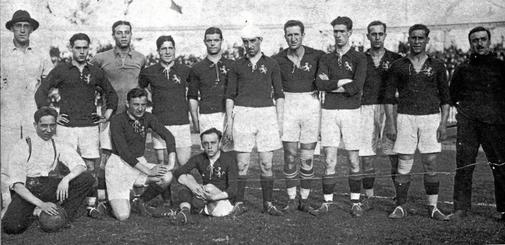On September 1, 1920, Spain played, in the Olympic Games in Antwerp, against Sweden, the third international game in its history. The first had been on August 28 against Denmark (1-0). The second, 29, against Belgium (1-3). The selection, which would end up winning silver, was made up of 15 Basques, three Galicians, a Spaniard and two Catalans who were the stars of the team: Ricardo Zamora (19 years old) and José Samitier (18). The 21 were reduced to 19, because Ramón González (Vigo Sporting) from Coruña became ill as soon as he arrived in Belgium and was admitted to a hospital. And the second and last goalkeeper, the Guipuzcoan Agustín Eizaguirre (Real Sociedad), felt so discouraged to see the phenomenal performance of Zamora against Denmark, that, sure that he would never play, he returned to Spain.
With Paco Bru (coach) and Luis Argüello (Federation treasurer) in charge of the expedition, the players, with third-class tickets, had left Irun by rail on the night of August 10. When they arrived in Antwerp, they were housed in some schools integrated in an enabled convent, after the First World War, as a cavalry barracks. There were no showers and the players, who slept in lounge chairs, washed themselves in the watering holes. Paying out of pocket with the federative diet (67 Belgian francs per day, about five pesetas to the change, 0.03 euro cents), they moved to the Hôtel Industrie.
They went out at night. To a port cabaret, a dangerous, but cheap, slum. However, the alcoholic joy that overwhelmed them in the early morning from 30 to 31 came from a more distinguished area: the Hotel Floralies Parc, where King Alberto entertained the participants in the Games. The Spaniards had that the next day they had no match against Sweden, because it, dissatisfied with the arbitration of their match against Holland, had withdrawn. But then he rectified and the Spaniards faced the new situation with a hangover from ... Championship. They managed to postpone the meeting one day. It would be, then, on September 1.
And there was born the Spanish fury, taking the label of the sacking of Antwerp, in 1576, by our thirds. The violent match against Sweden went to posterity when Belauste ( José María Belausteguigoitia , 30 years, more than ninety meters and 90 kilos), touched his head with a four-pointed handkerchief, yelled at Sabino ( Sabino Bilbao ), his companion in Athletic: "Sabino, to me the platoon, that I roll over!"
Said and done. Belauste received the squad with the pechazo or with the big head (it is not clear) and got in with him and a handful of Sweened offspring, in the goal. That was foul or penalty. In the absence of the VAR, and ignoring the chaos by the method of admitting it, the referee, Giovanni Mauro , took the goal for good. It was 1-1. Then I would mark Acedo .
Spain did not play Sweden again until July 16, 1950. Until the World Cup in Brazil. He lost 3-1.
According to the criteria of The Trust Project
Know more- Sweden
- Spain
- Denmark
- Belgium
- Real society
- Holland
- Brazil
- sports
- Olympic Games
Europe Euro budget: only 3.5 billion for countries in trouble
Eurocopa 2020Ibrahimovic accuses the Swedish coach of marginalizing players of immigrant origin
Trends From tradition to the most "cane": this is the footwear exported by the Community

